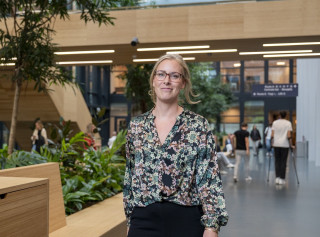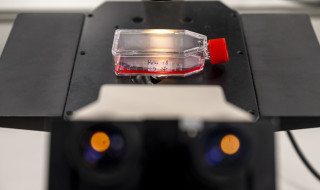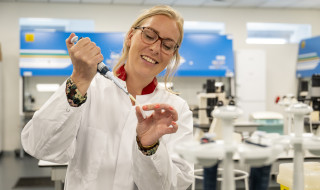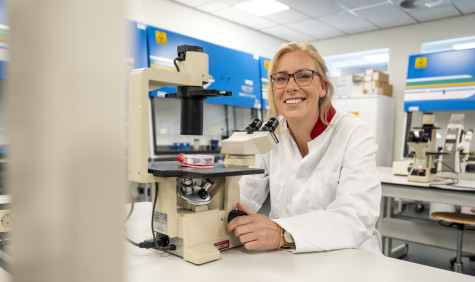Anna Posthumus Meyjes:
"AI is a blessing, as long as we teach students to think critically"
When Anna Posthumus Meyjes (42) talks about her work, her enthusiasm is unmistakable. The lecturer-researcher in Biology & Medical Laboratory Research at Leiden University of Applied Sciences radiates passion. "It makes me happy to show students what I have experienced myself in the lab. If you manage to convey that enthusiasm, something truly special happens."
Anna's fascination with biology and research began at an early age. "From an young age, I was fascinated by nature and everything that happens there. The choice to study Biology was therefore a logical one." She starts in Leiden with a bachelor's degree in Biology, but gradually discovers that the medical side attracts her at least as much. A master's in Biomedical Sciences follows, where she completed internships in infectious diseases. There, Anna becomes fascinated by microbiology and by the question of how bacteria cause infections.

Anna Posthumus Meyjes
That subject turns out to be not only topical, but also urgent. She works on a then-unknown hospital bacterium that is now among the top ten most dangerous hospital pathogens. "That has always fascinated me: how is it possible that one bacterium makes you sick and another does not? That interaction between host and pathogen is incredibly interesting."
This interest leads her to a PhD trajectory at the LUMC, where she investigates the mechanisms behind bacterial infections and later, as a postdoctoral researcher, contributes to the development of new antibiotics. She really likes the international network and the many collaborations. But somewhere, another passion is already lurking: teaching. "During my PhD I was already teaching and supervising trainees. I actually enjoyed that at least as much as the research itself."
"My own favourite bacteria"
Over eight years ago, Anna Posthumus Meyjes made the move to Leiden University of Applied Sciences, where she has been training students as laboratory analysts ever since. Her role is multifaceted: lecturer, researcher and curriculum coordinator. "I find that combination ideal. I can contribute to the broader design of the curriculum, but still stand in front of the class and see how students actually respond to what we’ve created.”
What attracts her to teaching? "The contact with students. Sharing knowledge, but also developing education. For example, when I taught a course on host-pathogen interactions, I was able to incorporate my own favourite bacteria into it. You bring that enthusiasm with you and students notice that."
For Anna, there’s no doubt that biology and IT have now become inseparable. She talks enthusiastically about the integration of digital tools in education: from e-learnings and learning management system Brightspace to statistical software and programming languages like R. "We don't train students to be programmers, but they do have to understand how to use such tools. With a few lines of code, you can analyse huge data sets - much more efficiently than in Excel. Once they experience that, a world opens up for them."

Artificial intelligence has become an indispensable tool for Anna in her work
No blind trust
For Anna, artificial intelligence has become a natural part of her work. She uses ChatGPT daily to prepare lessons and assignments and to analyse articles. "We have also developed a chatbot that helps students with pharmacological calculations. In the near future, we will test whether that adds value - I hope so."
Still, there is never blind trust. "The danger is that students take AI output for true. But the bottom line is: do you have enough knowledge to check whether it is correct? We have to teach them that critical thinking."
So is AI in education a curse or a blessing? For Anna Posthumus Meyjes, the answer is clear: "AI helps us reach solutions faster, just like a calculator once did. But you have to be able to assess whether the outcome makes sense."
"The danger is that students take AI output for true. But the bottom line is: do you have enough knowledge to check if it is true? We need to teach them that critical thinking"
Finalist Teacher of the Year
She sees artificial intelligence as a catalyst, not a replacement. "We will always need people. The lecturer, the researcher, the validation. But AI speeds up processes and can help approach more complex issues, such as protein folding or antibiotic development, more quickly. That opens up huge perspectives."
It’s no coincidence that Anna was invited to host an AI quiz at the SURF Onderwijsdagen. She previously reached the finals of the Teacher of the Year competition: recognition for her innovative and student-centred approach.

"It makes me happy to show students what I have experienced myself in the lab"
"I don't see myself as someone who knows everything better. I stand beside the student, not above them. That makes me approachable. I also see the quiz mainly as a way to explore, together with participants, how we can use AI meaningfully in education. It's not about AI replacing us. It's about getting ahead faster, learning to think more critically and preparing students better for their role in society. And that is perhaps what I like best of all: that I can contribute to that."
Text: Edwin Ammerlaan
Photos: Sicco van Grieken
